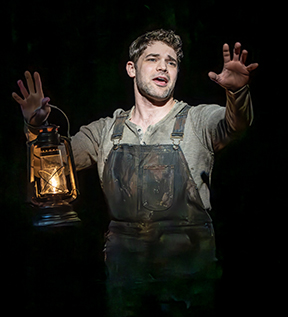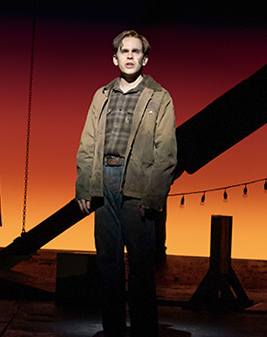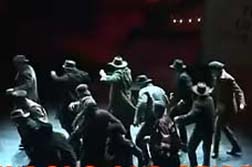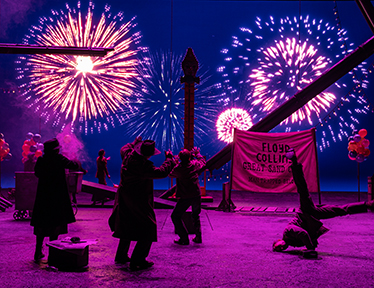by Lucy Komisar
Why would one want to do a play about a man trapped in cave in rural Kentucky in the winter of 1925? A true story. The book is by Tina Landau who also directed and presented it first in 1994 in Philadelphia. The Lincoln Center production is the Broadway premier.
Landau was a college student when she read about Collins in an American history book. The reference, called “Deathwatch Carnival,” talked about the media circus that attended the attempts to rescue him, which became a major national story. Landau used a 1979 book, “Trapped!,” by Roger Brucker, for details of what happened.
Collins (Jeremy Jordan with a melodious operatic baritone) walks, crawls, slides in the cave. His lantern lights the way for him and us. We hear echoes of his voice. When he sings, it is in a charming country western style. Music and lyrics are by Adam Guettel.
In the 1920s, Kentucky was promoting its caves as tourist sites. Floyd Collins was a “spelunker” – those people who unaccountably want to crawl into tight dark underground spaces. His family were farmers, but he didn’t like the land. At least, not the surface. He was hoping to lay claim to a cave and cash in.
He seems to be doing fine in this cave till he slips and gets his ankle pinned under a 27-pound rock at 200 feet underground. Then he accidentally knocks the flame out in his oil lamp. In darkness, he prays for rescue.
In recitative style, the lyrics tell the story. Floyd: “Always have gotten outta scrapes. Probably’ cause I git into ’em so easy. Lucky.”
The spirit of the music sometimes makes you forget the tragedy you are witnessing.
The locals almost immediately know what has happened. And soon so does the press. Skeets Miller (Taylor Trensch) a cub reporter for Louisville Courier Journal, arrives. He is quirky, committed, and as he is of slight build, slips through the cave passages to talk to Collins. His question, one of those trite and obvious human interest queries: “what’s it feel like to be trapped?”
The split stage is divided between the cave and the dirt ground with the hole leading into it.
Miller is so good that Bee Doyle (Wade McCollum), the farmer on whose land the cave is located, complains, “Hell, this Miller guy’s makin’ us locals look bad. Every time ya turn aroun’, he’s down under with Floyd an’ we’re up here, ya know, sittin’ on our butts.”
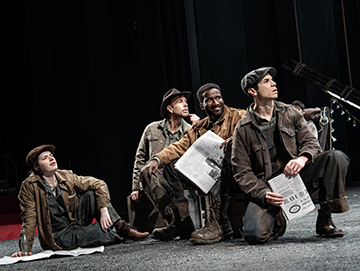
His story makes the front page of the Louisville paper and is syndicated by AP to 1200 US papers. Other reporters descend.
The three locals, Doyle, a caver, Ed Bishop (Clyde Voce) and the teenage Jewell Estes (Cole Vaughan), are fine when they (musically) brag to visiting reporters (Dwayne Cooper, Jeremy Davis, Charlie Franklin). In fact, the musical numbers are the best parts of the show.
The other characters are Collins’ sister Nellie (Lizzy McAlpine) and brother Homer (Jason Gotay). His father Lee (Marc Kudische, an excellent baritone), his stepmother Jane (Jessica Molaskey, a fine country singer), widower Lee’s second wife.

Then there is H.T. Carmichael, an engineer from Rock & Asphalt Company, who wants to dig shaft. A young filmmaker (Zak Resnick), campy with beret and boots, who is shooting Homer. A doctor from Chicago (Kevyn Morrow) considering the amputation of Collins’ foot. Yes, this is not for the squeamish.
The artistic lighting by Scott Zielinski sometimes shows characters as silhouettes against white backdrops.
The best number,“Is That Remarkable,” is a putdown of the self-aggrandizing herd of reporters with their grey coats, fedoras and cameras.
Later, the set (by the dots collective) includes the rescue equipment and food carts to feed 30,000 visitors. It’s become a carnival, a circus, with clown faces, balloons, even fireworks. So, Kentucky got its tourism – ghoulish thrill seekers arrived in the thousands to be near where Collins was slowly expiring from hunger, thirst and exhaustion.
Landau as director does colorful and smooth staging of the tension, the hype and the let-down. There are press conferences. Electric tools brought it to dig the shaft didn’t work, so they had to use picks and shovels and it was raining. The attempts to free the trapped man go on for fourteen days.
The Floyd Collins Great Sand Cave for tourists had been the hope of the family. But the promotion takes a turn for the crude when Homer is sent a contract to appear on a vaudeville circuit and tell his brother’s story.
Landau says now she thinks of this as being about an individual confronting his mortality. But that has to do with any end-of-life tale. She was right the first time. This is the story of an American dream turned into a nightmare. Perhaps underneath it all, it is what capitalism turns out to be for many of the people who dream and struggle to make it.
“Floyd Collins.” Book by Tina Landau, music and lyrics by Adam Guettel, direction by Landau. Lincoln Theater at the Vivian Beaumont, 150 West 65th St. NYC. Runtime 2hrs30min. Opened April 21, 2025, closes June 22, 2025. Video of musical clips.


